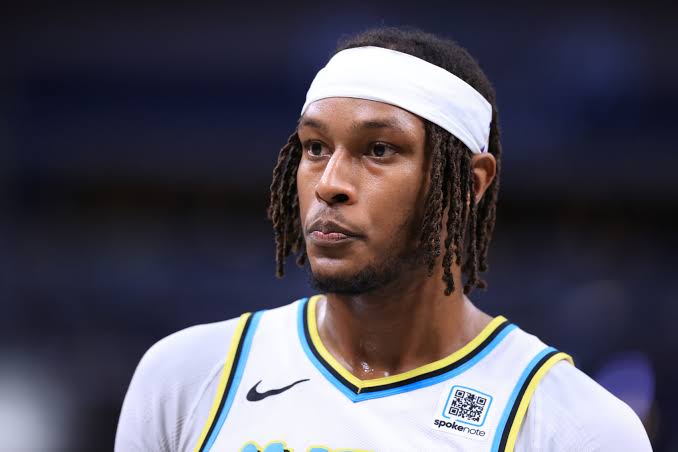🔵 Turner and the Pacers: A Decade of Ups and Downs
Loyalty meets frustration
Myles Turner was drafted 11th overall in 2015 and spent ten seasons with the Pacers, emerging as a defensive anchor, a shot‑blocking specialist, and a fixture of Indiana basketball. Despite being repeatedly shopped in trade rumors, Turner stayed loyal to the franchise — even while expressing his displeasure about feeling undervalued. “I have dealt with a lot of bullshit since I’ve been here… trade rumors… it never deterred my professionalism,” Turner remarked (iPacers – Indiana Pacers News).
A career year, but still wanting more
During the 2022–23 season, Turner posted career best offensive numbers — and emphasized that he wanted to use that performance to lead a title‑contending team. Yet, he conveyed that sometimes he felt relegated to a role player rather than a franchise cornerstone (SI).
🚧 Breakdowns in Negotiation & “Alignment Issues”
Stalled talks and low offers
Pacers president Kevin Pritchard later confirmed negotiations were slow and incremental. Indiana felt Turner’s expectations were above what they believed sustainable, while Turner apparently concluded they weren’t moving fast enough to meet him halfway. Pritchard explained that Turner’s choice to leave came as a surprise: he and the organization thought talks were in good faith—even as Turner chose to depart once the Bucks presented their offer (iPacers – Indiana Pacers News).
Turner’s public framing
In his introductory press conference with the Bucks, Turner referenced “alignment issues” between him and Indiana’s organization, suggesting that philosophical or strategic disconnects—not just money—were a key factor in his decision to move on (CBSSports.com).

💰 Money Matters and Strategic Shifts
Haliburton’s injury shifts the outlook
The catastrophe of Tyrese Haliburton tearing his Achilles in Game 7 of the NBA Finals threw Indiana’s future into question. Suddenly, investing heavily in retention felt risky for a team facing a transitional season.
Mismatch in valuation
Insiders reported Turner sought roughly $30 million per year. The Pacers’ feelers reportedly did not exceed $60 million over three years (~$20M/year), or at best $23M/year for shorter deals — seen by Turner as insufficient. In contrast, Milwaukee’s offer stood at $108–$109M over four years ($27M/year) with favorable terms including a trade kicker and player option (CBSSports.com, iPacers – Indiana Pacers News).
Despite Pritchard’s claim that Indiana was willing to step into luxury tax territory, it appeared the Pacers hesitated on making a full commitment in the wake of Haliburton’s injury and future uncertainty (CBSSports.com).
🤝 The Final Straw: Trust & Surprise
Catching news via Twitter
Perhaps the most glaring sign of dysfunction: Pacers leadership—including Pritchard and owner Herb Simon—learned of Turner’s signing with Milwaukee through a tweet from Shams Charania, not through formal notification. Pritchard described being “shocked” and stated that talks had never reached the sign‑and‑trade stage, making the rupture abrupt and painful (SI).
Fading locker room connection
In what felt like emotional distance, Turner said he texted the Pacers’ team group chat about his departure—but only “a few” teammates replied, underscoring how his exit felt personal and divisive within the locker room (SI).
🔄 Aftermath: A Loss for Indiana
The Pacers let go of a ten‑year cornerstone with no compensation in return. The organization now faces a roster void at center, compounded by Haliburton’s absence. While Turner moves to Milwaukee, Indiana enters a rebuilding phase punctuated by fan frustration and heightened scrutiny of front‑office decision‑making (M Sports).
Fan reactions were scathing:
“Y’all fumbled this one”
“Could’ve paid him what he’s worth you morons”
“You have been trying to transfer him since minute 1… and just when he is doing his best you let him go so as not to pay him the money he CLEARLY DESERVES” (ClutchPoints).
✅ Wrap‑Up: Did the Relationship Break Before the Contract?
- Contract negotiations slowed to a grinding halt. Indiana and Turner were negotiating, but the Pacers couldn’t—or chose not to—match Milwaukee’s aggressive offer.
- “Alignment issues” accompanied financial gaps. Turner implied cultural or strategic misalignment within the organization, beyond the dollars.
- Surprise and poor communication fractured trust. The fact that key people within the organization learned of the deal via social media pointed to a deeper breakdown.
- He wanted to compete. Turner expressed excitement at joining a veteran contender like Milwaukee, where he could align with Giannis, Doc Rivers, and management in a clearer vision for success.
This combination of financial stinginess, lagging negotiations, poor internal communication, and philosophical misalignment ultimately pushed Turner to exit — possibly ending a once‑stable ten‑year partnership.
